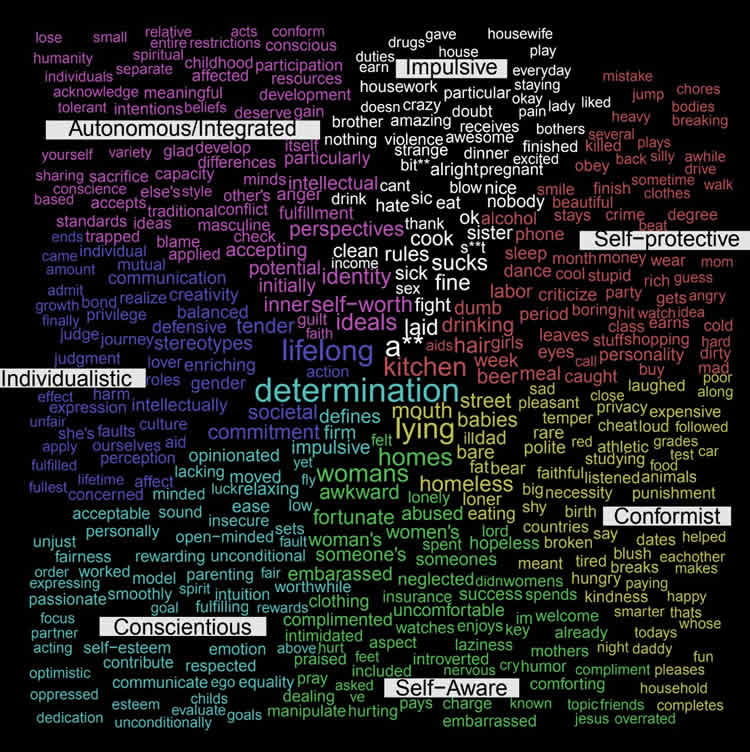Summary: A new study explores how personality development and ego may be reflected in our everyday language. Researchers hope their findings will shed light on moral, social and cognitive development.
Source: Florida Atlantic University.
When people think of “personality,” they are likely to think of traits such as warmth or extraversion. For example, a person with high extraversion tends to exhibit an enthusiastic, gregarious, socially dominant, reward-seeking style of social performance across a wide range of situations and contexts as compared to a person with low extraversion.
But personality also develops from self-involvement, through conformity, and toward conscience. These developing aspects of personality are frequently understood as “maturation.”
In a novel study, “Personality Development through Natural Language,” published in the international journal, Nature: Human Behaviour, Kevin Lanning, Ph.D., lead author of the study and a professor of psychology in Florida Atlantic University’s Harriet L. Wilkes Honors College, together with FAU Wilkes Honors College alumna Rachel (Evans) Pauletti, and collaborators Laura A. King, Ph.D., University of Missouri, and Dan P. McAdams, Ph.D., Northwestern University, examined how personality maturation or development was reflected in natural language.
For the study, they examined 44,000 brief samples of text collected over 25 years from the Washington University Sentence Completion Test (WUSCT), a measure of the stages of ego development. They also used the Linguistic Inquiry and Word Count (LIWC), which breaks down texts based on categories that include both syntactical composition and psychological meaning. The LIWC includes about 6,400 terms that are classified into 81 categories ranging from first-person singular pronouns (“I” and “me”) to drives such as power (“superior” and “bully”).
Results from the study find that throughout the course of development, language indicative of self-centeredness (e.g., using the word “I”) decreased, while complexity (words such as “but” and “although”) increased. LIWC categories associated with informality (leisure, assent) and impulse (anger, swear words, sexual, body, ingestion) were generally associated with declining ego level, while the relationship of ego development to verbosity or response length showed the greatest increases at the later stages of development. Taken together, these and other results provide support for the claim that ego development can be understood as a set of qualitatively distinct stages as well as a single dimension.

At the earliest of these stages, language was characterized by a preoccupation with impulse gratification. Subsequently, language was marked by a concern with appearance, then with “fitting in.” The next and most common developmental stage was found to be characterized by self-doubt and the costs and benefits of being in the public eye. Following this, a concern for achievement becomes paramount. At still higher levels of development, abstract considerations such as privilege arise and, ultimately, a still-broader perspective on life goals.
“Building on the empirical analysis of ego level and language will provide us with a deeper understanding of ego development, its relationship with other models of personality and individual differences, and its utility in characterizing people, texts and the cultural contexts that produce them,” said Lanning. “If ego development can be scored from everyday language, then the content of text from Twitter feeds to political speeches, and from children’s stories to strategic plans, may provide new insights into our state of moral, social and cognitive development.”
Source: Gisele Galoustian – Florida Atlantic University
Publisher: Organized by NeuroscienceNews.com.
Image Source: NeuroscienceNews.com image is credited to FAU.
Original Research: Abstract for “Personality Development through Natural Language” by Kevin Lanning, Rachel E. Pauletti, Laura A. King & Dan P. McAdams in Nature: Human Behaviour. Published April 9 2018,
doi:10.1038/s41562-018-0329-0
[cbtabs][cbtab title=”MLA”]Florida Atlantic University “Spoken Language Reveals How People Develop and Mature.” NeuroscienceNews. NeuroscienceNews, 9 April 2018.
<https://neurosciencenews.com/language-development-maturity-8742/>.[/cbtab][cbtab title=”APA”]Florida Atlantic University (2018, April 9). Spoken Language Reveals How People Develop and Mature. NeuroscienceNews. Retrieved April 9, 2018 from https://neurosciencenews.com/language-development-maturity-8742/[/cbtab][cbtab title=”Chicago”]Florida Atlantic University “Spoken Language Reveals How People Develop and Mature.” https://neurosciencenews.com/language-development-maturity-8742/ (accessed April 9, 2018).[/cbtab][/cbtabs]
Abstract
Personality Development through Natural Language
Ego level is a broad construct that summarizes individual differences in personality development1. We examine ego level as it is represented in natural language, using a composite sample of four datasets comprising nearly 44,000 responses. We find support for a developmental sequence in the structure of correlations between ego levels, in analyses of Linguistic Inquiry and Word Count (LIWC) categories2 and in an examination of the individual words that are characteristic of each level. The LIWC analyses reveal increasing complexity and, to some extent, increasing breadth of perspective with higher levels of development. The characteristic language of each ego level suggests, for example, a shift from consummatory to appetitive desires at the lowest stages, a dawning of doubt at the Self-aware stage, the centrality of achievement motivation at the Conscientious stage, an increase in mutuality and intellectual growth at the Individualistic stage and some renegotiation of life goals and reflection on identity at the highest levels of development. Continuing empirical analysis of ego level and language will provide a deeper understanding of ego development, its relationship with other models of personality and individual differences, and its utility in characterizing people, texts and the cultural contexts that produce them.







